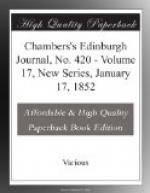Rembrandt accepted the offer, and during the following year toiled incessantly. Meantime his finances were dreadfully straitened; for his father, finding that the expected profits were very tardy, refused to give money to support his son, as he said, in idleness. Paul, however, was not discouraged. Although far from possessing an amiable or estimable disposition, he held a firm and just opinion of his own powers, and resolved to make these subservient first to fortune and then to fame. Thus while some of his companions, having finished their preliminary studies, repaired to Florence, to Bologna, or to Rome, Paul, determined, as he said, not to lose his own style by becoming an imitator of even the mightiest masters, betook himself to his paternal mill. At first his return resembled that of the Prodigal Son. His father believed that he had come to resume his miller’s work; and bitter was his disappointment at finding his son resolved not to renounce painting.
With a very bad grace he allowed Paul to displace the flour-sacks on an upper loft, in order to make a sort of studio, lighted by only one narrow window in the roof. There Paul painted his first finished picture. It was a portrait of the mill. There, on the canvas, was seen the old miller, lighted by a lantern which he carried in his hand, giving directions to his men, occupied in ranging sacks in the dark recesses of the granary. One ray falls on the fresh, comely countenance of his mother, who has her foot on the last step of a wooden staircase.[3] Rembrandt took this painting to the Hague, and sold it for 100 florins. In order to return with more speed, he took his place in the public coach. When the passengers stopped to dine, Rembrandt, fearing to lose his treasure, remained in the carriage. The careless stable-boy who brought the horses their corn forgot to unharness them, and as soon as they had finished eating, excited probably by Rembrandt, who cared not for his fellow-passengers, the animals started off for Leyden, and quietly halted at their accustomed inn. Our painter then got out, and repaired with his money to the mill.
Great was his father’s joy. At length these silly daubs, which had so often excited his angry contempt, seemed likely to be transmuted into gold, and the old man’s imagination took a rapturous flight. ‘Neither he nor his old horse,’ he said, ’need now work any longer; they might both enjoy quiet during the remainder of their lives. Paul would paint pictures, and support the whole household in affluence.’
Such was the old man’s castle in the air; his clever, selfish son soon demolished it. ‘This sum of money,’ he said, ’is only a lucky windfall. If you indeed wish it to become the foundation of my fortune, give me one hundred florins besides, and let me return to Amsterdam: there I must work and study hard.’




